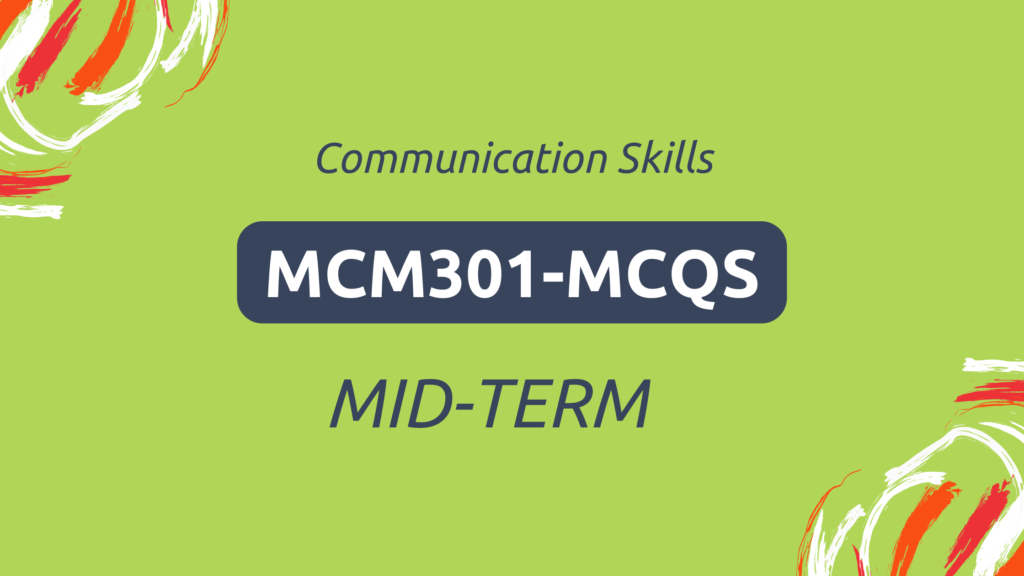Introduction
As the midterm exams in Virtual University of Pakistan draw near, many students look out for helping materials to ease study process. Understanding vu students need, we (SSWT) have compiled MCM301 Midterm MCQs – Communication Skills subject. We have arranged these MCQS chapter wise from lecture #1 to lecture # 22 with correct answers.
This helping material is a plus for students facing irregular study patterns or students who are full time/part time workers. With proper arrangement of MCM301 Midterm MCQS it will be a convenient and swift way to understand the subject. We hope you will find this ready made material helpful in your midterm exams at vu. Now you can prepare and pass your midterm exams with SSWT materials confidently!
Lecture # 1 – Communication
1. Interpersonal communication processes depend on how many qualities of the communicator?
- Four
- Five ✔
- Eight
- More than ten
2. What is involved in the communication process?
- Idea-encoding-channel-decoding-feedback ✔
- Idea-information-channel-receiver
- Information-channel-receiver
- Sender-receiver-channel
Lecture # 2 – Levels of Communication
1. What type of communication would it be when co-workers decide to meet to deal with a problem?
- Upward
- Horizontal
- Downward
- Intrapersonal ✔
2. Each morning Amna decides how to dress? What to eat? where to go? etc. This refers to which of the following levels of communication?
- Interpersonal Communication
- Mediated Communication
- Intrapersonal Communication ✔
- Person-to-Group Communication
Lecture # 3 – Interpersonal Communication
1. Which one of the following statements defines the situational context of interpersonal communication?
- It concerns your reactions to the other person.
- It deals with the psycho-social “where” you are communicating. ✔
- It is who you are and what you bring to the interaction.
- It deals with the physical “where” you are communicating.
2. Which one of the following defines interpersonal communication that occurs between people who have known each other for some time?
- Development view✔
- Contextual view
- Relative view
- Virtual view
Lecture # 4 – Communication in the Organization: Guiding Principles
1. Mediated communication occurs through:
- Letters, reports, forms, and interoffice memoranda ✔
- Letters, newspapers, and radio
- Newspapers, books, and TV
- TV, radio and wall chalking
Lecture # 5 – Communication Destination
1. Which of the following is the informal report used to communicate with individuals outside of organization?
- Letter ✔
- Memo
- Periodical
- Magazine
2. Motivation is the process of:
- Satisfying internal needs through actions and behaviors ✔
- Resolving issues in an informal or formal atmosphere
- Maintaining public relations
- Working with other employees in a depressed atmosphere
Lecture # 6 – Listening
1. Which of the following processes is the automatic psychological process of receiving aural stimuli?
- Listening
- Hearing ✔
- Filtering
- Speaking
2. Which of the following is the process of giving symbols meanings through the unique contents of each person’s mind?
- Listening
- Hearing
- Filtering ✔
- Speaking
3. Which of the following is correct about human memory?
- Not very sharp
- Reconstructive ✔
- Poorly developed
- All of the given
4. Which of the following involves grasping what the speaker means by seeing the ideas and information from his/her point of view?
- Listening✔
- Hearing
- Filtering
- Speaking
Lecture # 7 – Improving Your Listening Skill
1. All of the following are the tips to become a better listener, EXCEPT:
- Don’t talk while listening
- Keep an open mind
- Don’t jump to conclusions
- Creating interruptions ✔
2. On average, how faster can a person think than the listener can talk?
- Ten times
- Five times
- Four times✔
- Three times.
Lecture # 8 – Nonverbal Communication
1.Self-confident individuals stand more erect than those:
- who lack confidence ✔
- who are over confident
- who are submissive
- who are arrogant
2. Excitement is communicated by:
- A high-pitched voice
- The rapid rate of speaking
- Shrill voice
- All of the given ✔
3. Which of the following is NOT a form of nonverbal communication?
- Gestures
- Facial expression
- Appearance
- A radio interview ✔
Lecture # 9 – Barriers To Communication
1.Conflicting information develops:
- Mental turbulence ✔
- Good understanding
- Psychological disorders
- Sharp thinking
Lecture # 10 – Barriers To Communication (Part 2)
1. Partial or marginal listening can distort the intent of which of the following?
- Message ✔.
- Channel
- Source
- All of the given
2. ___ is a process which demands that full attention be paid to the spoken material.
- Speaking
- Listening ✔
- Hearing
- Dialogue
3. ___ can also seriously impede the transmission of ideas.
- Tolerance
- Broadsides
- Prejudice ✔
- Acceptance
4. Poor retention either on the part of the sender or on the part of the receiver can create problems or lead to ___
- Misunderstanding ✔
- Hatred
- Understanding
- Generosity
Lecture # 11 – Overcoming Communication Barriers
1. Select who/which of the following is responsible to initiate actions to overcome physical barriers:
- Sender ✔
- Receiver
- Medium
- Message
Lecture # 12 – Speech
1. While you plan to make a good speech, you must be engaged in which of the following?
- Audience-centered approach ✔
- Self-centered approach
- Theme or idea of the subject
- Results
2. When centering on the audience, you start by finding ___ that enable you to identify with them.
- Rare traits
- Common traits ✔
- Extraordinary character
- Unusual quality
3. Which of the following is not a demographic characteristic?
- sex
- age
- cultural background ✔
- attitude
4. Audience information such as age, gender, education, and socioeconomic status falls into a category known as
- Profiling
- Demographics ✔
- Topoi
- MYGLO
5. Which phrase shows the key rule to make a good speech?
- To keep in mind that audiences care most about things that directly affect them
- To avoid the audience’s choice and most about things that directly affect them
- Centring on the self
- To keep in mind that idea that is presented in speech ✔
A helpful tip: To secure a perfect score in the multiple-choice questions section of your MCM301 Midterm Exam, it’s crucial to thoroughly read and absorb the handouts provided by Virtual University of Pakistan (VU). These handouts are like treasure maps, guiding you through the key concepts and crucial information you need to ace your MCQs. When you take the time to delve into the materials provided, you equip yourself with the knowledge and insights necessary to confidently tackle any question that comes your way. So, make it a habit to study those handouts diligently, and you’ll be well on your way to achieving a 100% score in your upcoming MCM301 Midterm MCQs in Exams.
Lecture # 13 – Selecting A Topic
1. In general, there are ___ of newspaper indexes:
- Two kinds
- Three kinds ✔
- Many kinds
- None of the given
2. All of the following correct about the rules of finding a topic of speech except:
- begin early.
- choose a topic you are interested in
- select a topic you know about or easily research
- electronic periodical indexes ✔
3. All of the following types of periodicals except:
- Journals
- Magazines
- Newspapers
- Note-cards ✔
Lecture # 14 – Thesis Statement
1. A thesis statement is a ___ of your speech.
- Core idea or bottom line ✔
- End of the speech
- Body
- Indirect statement
Lecture # 15 – Introduction of Speech
Will be available soon…
Lecture # 16 – Body of Speech
1. Which one of the following pattern is especially effective if the audience already knows that the problem exists?
- problem/solution order
- cause/effect order ✔
- deductive order
- inductive order
2. All of the following statements are the purposes of forming an outline for a speech EXCEPT one. Which one is it?
- It helps put order to the information
- It serves as a model to check your work
- It serves as a guide from which to deliver your speech
- It helps to build confusion for the listeners ✔
Lecture # 17 – Modes of Delivery
1. Which type of speaking relies on speaking notes?
- Manuscript ✔
- Memorized
- Impromptu
- Extemporaneous
2. Which one of the following is a planned and rehearsed speech that uses different words during rehearsals?
- Manuscript speech
- Memorized speech
- Impromptu speech
- Extemporaneous speech ✔
Lecture # 18 – Strategic Oral Delivery
Will be available soon…
Lecture # 19 – Making a Good Speech
Will be available soon…
Lecture # 20 – Handling Questions and Answers
Will be available soon…
Lecture # 21 – Responding Questions & Answers
Will be available soon…
Lecture # 22 – Significance Of The Setting
Will be available soon…
Unknown MCM301 Midterm MCQs Lectures
1. Farah was doubtful about Saman’s intentions when she was trying to convince her to invest in the new project. Which form of listening is it?
- Empathic listening
- Critical listening
- Active listening ✔
- Preferential listening
2. Which of the following is a strategy for better listening?
- Listen for facts, not feelings ✔
- Listen for feelings only.
- Listen for feelings as well as facts.
- Listening to facts that demonstrate feelings
3. What does frequent eye contact show?
- Tension
- Liking ✔
- Rejection
- Boredom
Upcoming MCM301 Midterm Content
As you may have noticed, we have diligently crafted and organized a comprehensive set of multiple-choice questions (MCQs) tailored for VU students preparing for the MCM301 midterm MCQs examination. Your academic journey doesn’t end here; we’re excited to inform you that we’re currently working on developing MCM301 midterm short notes to further enhance your preparation. Stay tuned for these valuable study resources that will provide you with a comprehensive and holistic approach to excel in your midterm exams.
What to do in the meantime? In the meantime, we encourage you to join our Facebook group and follow our Facebook page. By doing so, you’ll stay updated with the latest announcements, study materials, and valuable insights to boost your MCM301 midterm exam preparation. Don’t miss out on this opportunity to connect with our community and make the most of your academic journey. Join us on Facebook today!
Conclusion
In preparation for the midterm exams at the Virtual University of Pakistan, SSWT has provided a valuable resource for students studying MCM301 Midterm MCQs. With organized MCQs and correct answers, this material is helpful for those with irregular study patterns or who work alongside their studies. SSWT’s comprehensive arrangement of MCM301 Midterm MCQs offers a convenient and swift route to understanding the subject. We trust that this ready-made resource will be a valuable aid in confidently passing your vu midterm exams.
Remember, if you spot any mistakes in MCM301 Midterm MCQs, feel free to contact us. And if you have materials to share, we welcome your contributions.
Good luck with your MCM301 Midterm MCQs and Exams!




